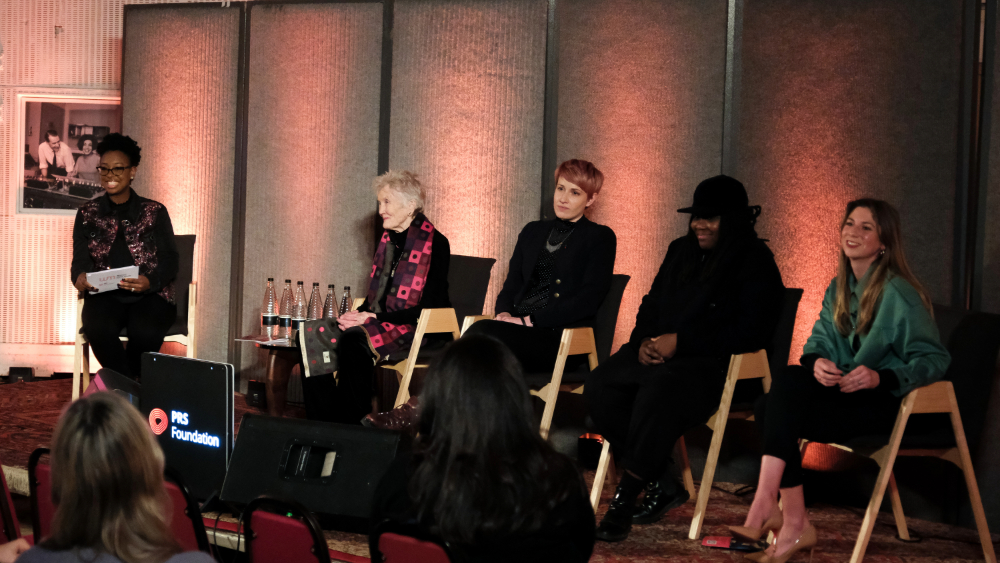For many music creators, securing funding for their work can be a game-changing career accomplishment. PRS Foundation is the UK’s leading charitable funder of new music and talent development, offering a range of grants across genres and career stages.
But which funding grant should you apply for? What is the best way to approach a funding application? And how can you stand out in such a competitive process?
Get set for success with our top tips for how you can navigate your next funding application.
What can I use music funding for?
Several funding grants are currently available to support such music-related projects as:
- Creating new music — writing, recording, collaborating with others
- Live performance — funding concerts, showcases or tours
- Marketing and promotion — activities which aim to develop your audience
What funding am I eligible for?
Every funding organisation has specific criteria for who is eligible to apply and what project activities are covered by their grant. For example, some grants will only be open to those aged 25 and under, while others will be exclusively available to creators who work in certain genres. In many cases, though, funding is widely available to creators who have been making or performing music for at least 18 months prior to submitting their application.
Funders will include their eligibility information, as well as application guidance and FAQs, on their websites. The key is to then read this information first and do your research. You will likely come across the phrase ‘eligible activities’, which refers to the components of a music project that will be supported by a grant if your application is successful. It should be noted that not all music-related activities are eligible for funding — for example, aspects such as travel costs or purchasing new recording software are not covered by all funders.
The timing of your project will also impact your eligibility. Make sure that the project you’re seeking funding for will take place after the funding decision date — any activities that take place beforehand (AKA ‘retrospective projects’) aren’t generally eligible for funding support. The funding decision date can be several weeks, or even months, after the application deadline.
What level of funding should I apply for?
A clear, realistic budget is one of the most important, yet often overlooked, parts of a funding application. You’ll have a better chance of being successful if your budget is based on realistic costs and activities. Provide as much detail about your plans as you can, including estimated and confirmed costs, and explain how each budget item impacts the overall project.
Here are some examples of what to include in your budget:
- Costs for studio time (rehearsals and recording)
- Mixing and mastering costs
- PR and marketing activities, including videography, photography, graphic design, PR services and digital marketing costs
Eligible activity costs and further advice on preparing your budget will be included in each fund’s guidelines and FAQs.
It's also worth noting that funders often expect you to have a minimum level of income from other sources, as many will not fund 100% of the cost of a project.
What information do I need to include in a funding application?
Funding applications provide an opportunity for you to detail where you’re at in your music career, what you need funding for and why this financial support can help propel you forward. You need to have a clear plan of action included in your application which lists the actions and steps you’ll take to bring your project — whether it’s recording and releasing new music or touring — from idea to execution.
Your application should also clearly demonstrate how funding will help you meet your chosen funder’s priorities. For example, if the grant is intended to facilitate national touring opportunities, then you must show how your music has scope for growth in your chosen market.
One of the biggest challenges of writing a funding application is striking the balance between sharing enough detail about your work and not overwhelming a funder with unnecessary information. Focus on clarity, keep things as simple as possible and structure your application so it’s easy for the funding assessor to understand your ideas and intentions — don’t be afraid to use headings and bullet points.
Some funders also accept video and/or audio applications rather than written applications. This can be a great option to lean into, especially if you’re more confident presenting your ideas in this format.
How much time should I invest in writing a funding application?
Planning is free, but rushing is expensive. Approach a funding application in the same way you would any part of your release strategy — planning things out in advance will only benefit you in the long term.
Give yourself plenty of time to map out what success looks like for your project, and explain in measurable detail how the funding will support your plans. For example, instead of saying ‘funding will be used to promote the album on social media’, you could be more specific and provide measurable outcomes:
- ‘Funding will be used for eight Meta ads across the release cycle, with the goal of increasing my online audience reach and engagement by over 150%’
- ‘Funding will be used to create short-form content for social media channels over three months to support digital audience development, adding 1000 new followers’
Clear, realistic and specific goals demonstrate that you are committed to using any funding efficiently and effectively.
As mentioned, it’s vital that you don’t rush your application. Ask someone else to read it through in advance, even if they’re not from a music industry background.
More top tips for your funding application
Now that we’ve covered the basics, here are some more handy tips and pieces of advice to consider when you decide to apply for music funding.
- Your audience: funders often want to know about the people you plan to reach with your work, and what impact you expect to make on those communities. Provide relevant examples that demonstrate a growing fanbase, any airplay you’ve had, good reviews, current social media activity, or prestigious gigs.
- Your information: include everything relevant you want the funding assessor to see — don’t rely on them looking things up. Remember to keep your online presence up to date across your website, social media and DSP platforms.
- Your planned activities: when outlining your plans, ‘confirmed’ or ‘provisional’ activities are generally prioritised. For example, a UK tour with six confirmed dates is more likely to receive funding than a tour with no dates confirmed. If you’re unable to include any ‘confirmed’ activity, make sure to include such details as an approximate timeline, names of venues you intend to use, individuals you’re planning to work with, or a track record of making similar projects happen in the past.
- Your music: highlight your best and most relevant music, including works that are ideally less than 18 months old. Make sure as well that your streaming links are correctly listed in your application.
Tell your story
While meeting eligibility criteria and providing a solid, budgeted plan are essential pieces of a funding application, your story as an artist is what make you unique. Remember that funding juries comprise of fellow creatives and music industry professionals who want you to win, so don’t be afraid to share your artistic goals, existing audience and past successes.
Try, try and try again
Due to high demand for the limited number of funding grants that are currently available, it can take several attempts at applying before you get your desired outcome. If you’re not successful with your first application, ask for feedback where available and incorporate those learnings into your next application.
Know your champions
If you receive funding, be sure to maintain a good relationship with your funder: they’ll be invested in your success and will want to celebrate your achievements. An appreciative tagged post on social media when your project is underway can go a long way to keep them engaged with your career, and could prove to be useful if you need further support in the years to come.
Funding organisations
There are many organisations which currently offer funding to music creators, so check regularly online and follow them on social media to hear about the latest opportunities and deadlines.
Here are a select number of the UK’s key music funding organisations:

.ashx?h=67&w=80&la=en&hash=E8662B19DB6CA618F431C4DF6AD51C6B)



